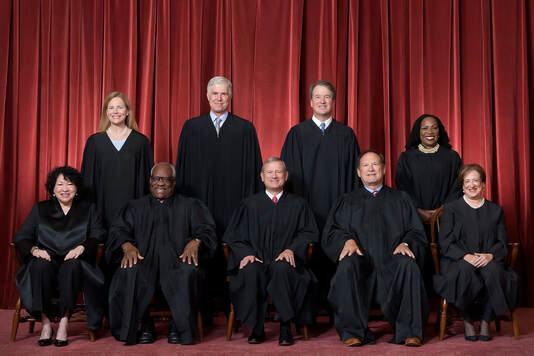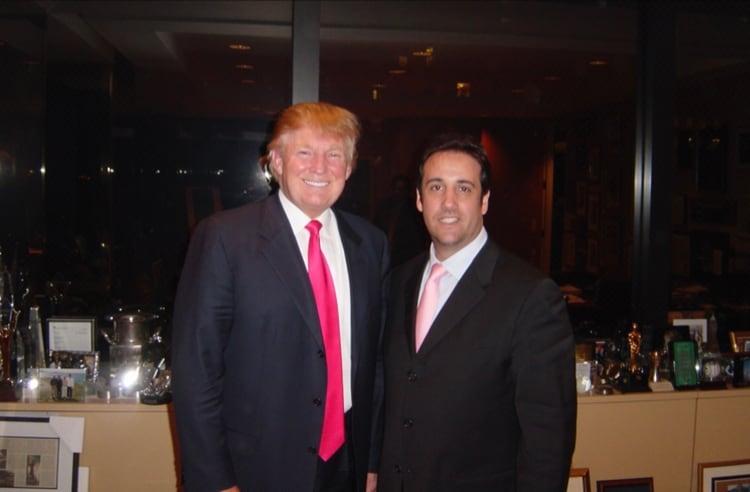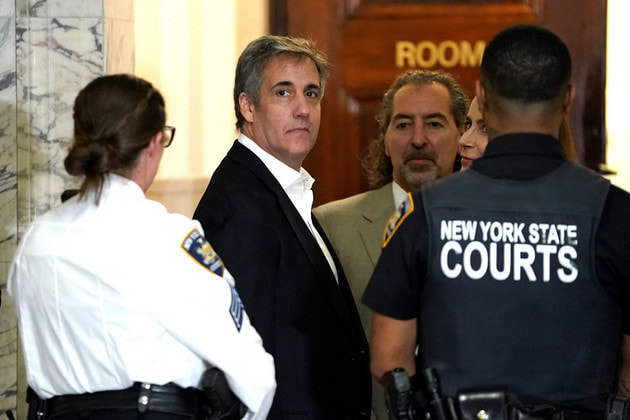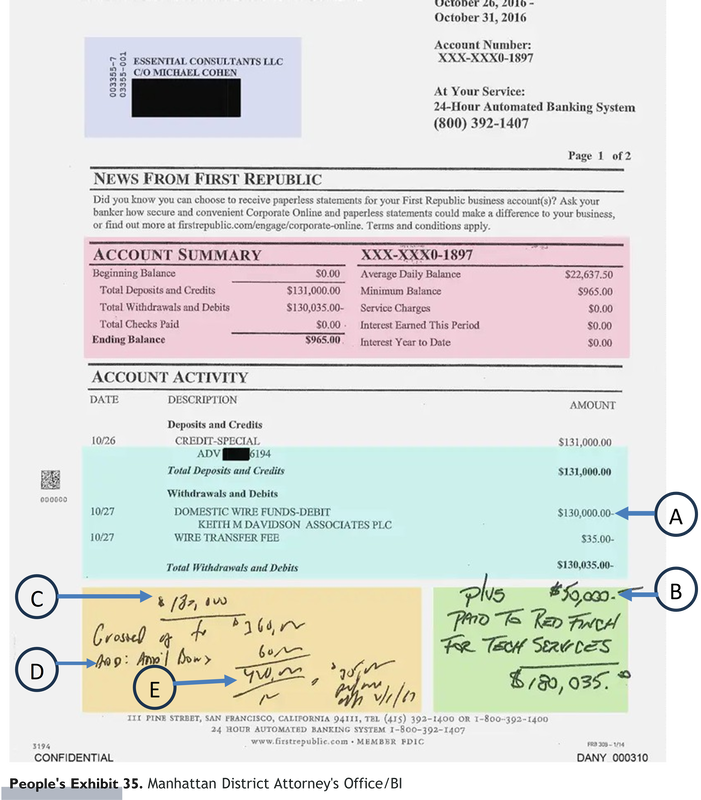Alternatively, Trump's defense team claims that the entire $420,000 represents Cohen's salary for legal services. Their most compelling support for this claim is that it is approximately what his salary was the previous year. There is a severe problem with the defense's argument. If $420,000 is Cohen's salary, then Cohen could not have stolen $30,000. One cannot steal one's salary! Yet, the defense is contradicting their primary defense of Trump.
|
A critical element in Donald Trump's hush money trial is whether the $420,000 Trump paid to Cohen in twelve $35,000 checks was Cohen's salary or reimbursement for money Cohen paid on behalf of Trump. According to the prosecution, these twelve checks were mostly a reimbursement for money that Cohen had paid to keep porn star Stormy Daniels quiet about her sexual encounter with Trump. The prosecution's proof for explaining the money is a worksheet (Exhibit 35) with handwritten notes by Trump's Chief Financial Officer, Alan Weisselberg. This note shows that (A) $130,000 was wired to Keith Davidson Associated on 10/27 (Stormy Daniels' attorneys); (B) $50,000 paid to Red Finch for Technical Services; (C) $180,000 "grossed up" to $360,000; (D) $60,000 for a bonus; and a total of (E) $420,000. Cohen says that he paid Red Finch $20,000 for phony poll results for Trump, although he claimed that these services to Red Finch cost $50,000. In other words, Cohen admitted to stealing $30,000 from Trump. It is also important to note that the prosecution and Cohen maintain that $180,000 is "grossed up" or doubled so that Cohen would not "lose" $90,000 to taxes because Cohen was in the 50 percent tax bracket. The note does not show a $60,000 bonus for Cohen being grossed up, presumably because employers do not pay employee taxes.
Alternatively, Trump's defense team claims that the entire $420,000 represents Cohen's salary for legal services. Their most compelling support for this claim is that it is approximately what his salary was the previous year. There is a severe problem with the defense's argument. If $420,000 is Cohen's salary, then Cohen could not have stolen $30,000. One cannot steal one's salary! Yet, the defense is contradicting their primary defense of Trump.
0 Comments
By Guest Contributors: Burton Blistein and Brigitte Savage It is clear that Donald Trump, not President Biden, controls many of our most critical domestic and international decisions. The border issue cannot be solved because Trump does not want it solved. We cannot supply essential aid to Ukraine because Trump does not want it supplied. If in the future Ukraine is funded such funding must, according to Trump, take the form of a loan. (The nation defending the West with its blood and territory must pay for that privilege!) The Senate cannot appropriate funds unless the House agrees; and the House is clearly subservient to Trump. Trump does not control the presidency, but the president cannot act without the cooperation of the branches that Trump does control. Biden confirmed this and Trump’s supremacy when he twice asked Trump’s assistance to resolve the border issue.  The Supreme Court as composed June 30, 2022 to present. Front row, left to right: Associate Justice Sonia Sotomayor, Associate Justice Clarence Thomas, Chief Justice John G. Roberts, Jr., Associate Justice Samuel A. Alito, Jr., and Associate Justice Elena Kagan. Back row, left to right: Associate Justice Amy Coney Barrett, Associate Justice Neil M. Gorsuch, Associate Justice Brett M. Kavanaugh, and Associate Justice Ketanji Brown Jackson. Credit: Fred Schilling, Collection of the Supreme Court of the United States To this we must add that the Supreme Court has surrendered to Trump by refusing to address the genuine constitutional issues that would prohibit his candidacy and by deliberately delaying a decision that would enable Trump’s trial for violating the constitution to proceed before the election. The Justices redefined the case before them so that the issue became whether Colorado was entitled to bring it, rather than whether Trump’s rebellion against the Constitution prohibited his candidacy, as in fact it clearly did. Both liberal and conservative justices appear to have concurred in this strategy. Their argument that such a momentous decision should be left to the electorate is contradicted by their decision to slow-walk Trump’s immunity claim and so possibly defer his trial until after the election, thus depriving the voters of the critical information they would need to choose wisely. How are we to account for such behavior, which appears to transcend political and philosophical differences and violates common sense?
Trump has carefully recruited and nurtured an army of thugs committed to making life impossible for those who oppose him. They have intimidated members of Congress, many of whom privately admit that they fear for themselves and for their families. Trump has made it a practice to include the judiciary among those certain victims. Members of the Supreme Court must have been aware that, should they prevent Trump’s candidacy as the Constitution required, they would have been forever subject to the vicious predations of his devoted minions, and indeed would become their primary targets. There was, accordingly, virtually no chance that they would have denied his candidacy. Trump subsequently thanked the Justices publicly, indicating that because of their submission they need not fear his wrath or that of his followers. The Court’s unnecessary delay adjudicating Trump’s claim of Presidential immunity figures as another similarly motivated submissive gesture on Trump’s behalf. The Court thus committed us to a course in which the very rule of law is threatened while itself affording the chief example of why and how this occurred. One must assume that like considerations, plus perhaps hope of advancement, dictate Judge Cannon’s otherwise inexplicable behavior. In sum, with respect to the issues that concern him Trump effectively controls two of the three branches of government. Those who warn us that our votes will determine whether we will live in a democracy in the future or in a dictatorship are therefore wrong. That “future” is our present. The press actively contributes to this sorry state of affairs when they speak of the “new normal” or use similar terms to describe Trump’s depredations. They thus “train” the public to accept those abominations and ignore their truly horrific consequences. The gravity of our current situation requires first, that the government and press acknowledge it, and second decisive action by Biden to restore the balance. He should not seek accommodation with Trump or those beholden to him. He should use his remaining powers to shut down the border if that proves necessary and his drawdown authority to immediately channel essential weapons to the Ukrainians. He must demonstrate that he, not Trump, is in charge and seek every opportunity to do so. Currently, the “optics” are very bad for Biden. Notwithstanding Congress’s delay in acting, he has managed to continue to supply Israel with the weapons to kill thousands yet has been languid in supplying the most advanced weapons for Ukraine to defend itself against an unprovoked attack, resulting in the deaths of thousands. Trump has deliberately created a climate of fear. To this he owes much of his power. We urge a task force devoted to dealing specifically with Trump’s domestic terrorism, which is much more diffuse, prevalent, transparent, and dependent upon the internet than that of foreign adversaries. We hear a great deal about threats to individuals by Trump’s followers, but very little about the apprehension of those who make such threats. That must change if we are to restore confidence in the rule of law. Should Trump lose the election we can expect a significant increase in the nefarious activity of his minions. We must be prepared for this. A task force such as that described would clearly help and define and make explicit for the voters the importance of the issues confronting them. At the beginning of 1980, Ronald Reagan, the challenger, trailed Jimmy Carter in the presidential race. However, the overthrow of the Shah of Iran by radical Islamists led to an oil shortage. The results on the U.S. economy were brutal: a 40 percent jump in U.S. gas prices, gas shortages, long lines, and an inflation rate of 13.3 percent. These events helped lead to the most severe recession since the Great Depression and the onset of stagflation (slow economic growth and high unemployment). The American public was unhappy, as Carter's falling poll numbers showed. Republicans began savoring their expected takeover of the White House. Surprisingly, as the polls turned in Reagan's favor, Republicans became more concerned about the possibility of some event derailing their expected victory. Reagan's campaign manager and trusted advisor, Bill Casey, was apprehensive about an "October Surprise," an unexpected event redounding to Carter's advantage. Casey believed that the failure of the Carter administration to secure the release of the hostages was mainly responsible for Carter's drop in the polls. Casey feared that an October Surprise, like Carter securing the release of the hostages, could rejuvenate the Carter campaign and lead to Carter's victory. Casey was determined to nip any potential October surprise in the bud.  Ronald Reagan and his presidential-campaign chairman, William Casey, in June 1980. PHOTO: ASSOCIATED PRESS Ronald Reagan and his presidential-campaign chairman, William Casey, in June 1980. PHOTO: ASSOCIATED PRESS In the summer of 1980, Casey devised a three-part plan for preventing an October Surprise. The first part consisted of establishing a committee of foreign-policy experts to monitor global events, especially those related to Iran, and alert the Reagan campaign to develop mitigation measures. The second part of the plan involved sending John Connolly, a former Texas governor, and his mentee, Ben Barnes, to Jordan, Syria, Lebanon, Saudi Arabia, Egypt, and Israel to relay a message to the Iranian government. Casey wanted these governments to let the Iranians know that they could expect a better deal for releasing the hostages from Reagan than from Carter. Connolly and Barnes, as directed, delivered Casey's message to the Middle East leaders. And the month after returning to Texas, they met with Casey for a debriefing. The third part of Casey's plan was to meet in Madrid with Ayatollah Mehdi Karrubi, a high-ranking representative of the Iranian government. Various sources reported that Casey told Karrubi that Iran would get a better deal for the hostages from Reagan than from Carter. However, these accounts of a Madrid meeting were discounted because various investigators believed that Casey was at a conference in London. Recently, one investigator found evidence showing that Casey was in Madrid for one day before arriving at the London conference. Although Carter has received credit for negotiating the release of the embassy hostages, they were not released until one hour after Reagan was sworn in as president. As a result, some observers suspected that the Reagan campaign had interfered with Carter's negotiations for the release of the hostages. To counter the suspicious timing of the hostage's release, Reagan's defenders cited two reasons. First, as governor, Reagan was well-known for being a hands-off manager who delegated the execution of his plans. Thus, it seemed reasonable that he would be unaware of all the activities other team members might have implemented without his knowledge. Casey's relationship with Reagan, an old friend, and his current campaign manager, lent support to Reagan, letting Casey run things. However, while Reagan could be oblivious about those issues in which he had little interest, he was dogged about those things he considered critical. (The extent to which Reagan was actively involved in the problems he was concerned about was seen in the Contra Affair.) Second, Reagan was on a path to winning; it would have been counterproductive to do anything that might have prevented the campaign from winning the election. Casey, however, was vociferous in his belief that if Carter could engineer the release of the hostages, Carter could still defeat Reagan. And if Casey believed this, it is unlikely that Reagan would have had a different opinion. Reagan's lead in the polls had been up and down, although Carter was trailing by the summer of 1980. Why would Ragan gamble on making a deal with the Ayatollah? Despite those concerns, Reagan had another consideration. This run for president was Reagan's third; he was 69 years old. He would almost certainly not have another opportunity to run for president again. Also, Reagan's victory would help seal right-wing supremacy in the Republican Party.  Blindfolded US hostages and their Iranian captors outside the US embassy in Tehran (Reuters) Blindfolded US hostages and their Iranian captors outside the US embassy in Tehran (Reuters) Casey and Connolly's message to the Iranians was that they would receive a better deal from Reagan than Carter. Although this message would have resonated with Khomeini because of his hatred for Carter (Carter had supported the Shah). Reagan also promised to offer more to release the hostages than Carter. Whatever Reagan was promising would eventually be paid by the American people. Iran was fighting a deadly war against Iraq and needed U.S. arms and replacement parts for the U.S.-equipped military the Shah had built. Because of the embargo Carter had placed on the direct sales of military equipment to Iran, Israel became a prime source for the Iranians. Israel could supply U.S. equipment, and Israel was more than willing to act as a middleman. Israel hoped to improve relations with Iran and saw Iraq as a more significant threat.
Any agreement between the Reagan campaign and Iran would involve commitments. Regardless of whether Reagan was involved, any commitments made to Iran would be a deal the Iranians could pressure the U.S. to keep. If Reagan had been engaged, those commitments to Iran would have been more likely fulfilled. Reagan, for example, publicly pledged to enforce the arms embargo against Iran. Even if Reagan had not been initially involved in dealing arms to Iran, it would have been nearly impossible to have fulfilled the agreement without letting him know. Reagan had promised that the U.S. would never ransom Americans held by terrorists. Yet, Reagan threatened to "call off the Iranian deal" unless the hostage, Cynthia Dwyer, the wife of Richard Allen, National Security Director's college roommate, was released by the Iranians, along with an Iranian American Rockwell International employee and three British missionaries. Ronald Reagan was directly involved in an arms-for-hostages negotiation despite his pledge not to engage in such swaps. The circumstances of both the release of the embassy hostages and Cynthia Dwyer are strong circumstantial evidence that Reagan was involved in both arms-for-hostages deals. Reagan's inner circle members ensured his arms transfer participation was hidden. For example, there was evidence that Casey had met in Madrid with representatives of the Iranian government. This information was hidden and only discovered recently. Shielding Casey, Reagan's close friend, also shielded Reagan. Within three months of Reagan's inauguration, his Secretary of State, Alexander Haig, gave implicit permission for Israel to ship U.S.-made military spare parts and fighter planes to Iran. It was understood that the U.S. would replace the depletion of U.S. arms from Israel's stockpile to Iran. Later, Haig denied that he had permitted the sale of arms to Iran. National Security Director Richard Allen claimed that Reagan's order to "call the deal off" if Cynthia Dwyer was not released referred to the Algiers Accords, an agreement between Iran and the U.S. negotiated by Carter. These Accords called for the release of Iranian funds held by the U.S. in return for the release of the hostages seized in the U.S. Embassy. Not only had the embassy hostages already been released, but it was also the position of the Reagan administration that the Accords were, in effect, paying ransom for hostages. The Reagan administration had foresworn any deals made with terrorists for the release of hostages. Reagan could ignore his promises when he chose. Despite public pronouncements supporting a ban on arms sales to Iran and negotiations with terrorist groups like Hezbollah, the evidence seems clear that Reagan permitted arms to be sold to Iran through Israel. Another group of hostages was seized in 1984 by Hezbollah and included CIA Station Chief William Buckley, the Revs. Benjamin Weir, Lawrence Jenco, Peter Kilburn, David Jacobsen, Thomas Sutherland of American University, and Terry Anderson, an Associated Press correspondent. Reagan obtained the release of these hostages through arms sales to Iran. The Reagan administration's sales of arms to Iran while censuring Carter's efforts to free the embassy hostages and pledging to renounce such deals was undoubtedly hypocritical. Equally portentous, however, was the Reagan administration's discovery of the template for freeing hostages held by Iran by selling them arms. Indeed, Reagan's agreements with the Iranians may have led to additional hostages being seized. As a result of having this arms-for-hostages template, Reagan's National Security Council wound up obtaining the resources needed to subsidize a covert war against the socialist government of Nicaragua. Even before Reagan took office, he was convinced that the Carter administration's focus on human rights was misplaced. The new administration was confident that the Carter administration was allowing communism to take root in both Iran and throughout Latin America. Reagan was determined to reverse what he saw as a dangerous trend. The Reagan administration saw an opportunity in Iran. Fearing that the ongoing turmoil in Iran would provide an opening for Russia to exert its influence, Reagan agreed to improve relations with the Iranian government by selling its weapons. Iran, during the war with Iraq, needed heavier missiles. If the U.S. agreed to the sale, such U.S.-made missiles would be available through Israeli arms dealers. To ensure a U.S. agreement, the arms dealers offered the release of CIA station chief William Buckley. This offer and the Israeli government's urging convinced Reagan to give his final go-ahead. The U.S. sold missiles to Iran, although only one hostage, Reverend Benjamin Weir, was released. Another opportunity occurred because a left-leaning government took power in Nicaragua – the Sandinistas - and spurred a rebellion by the Contras. From the first days of his presidency, Reagan had been covertly aiding the Contras. As Reagan's aid increased, Congress reacted by imposing increasingly restrictive limitations on the assistance that Reagan could bring to bear. By 1983, Congress had passed the Boland amendments prohibiting the U.S. from providing any military or paramilitary aid to the Contras. Reagan's response was to seek money for the Contras from other countries despite acknowledging that such assistance might violate U.S. law. Reagan's respect for the law seemed porous when the law conflicted with his wishes. By May 1984, the National Security Director, Robert McFarlane, was able to obtain "humanitarian" funds from Saudi Arabia that, over the next eight months, would total $32 million. As military operations in Nicaragua increased and the need for aid grew, the Reagan administration, led by Colonel Oliver North and the NSC staff, struggled to keep the Contras supplied. Besides the logistical problems of secretly providing the arms for a war against the Nicaraguan Sandinistas, the cost of the war exceeded what the Saudis and other third parties provided. By December of 1985, North told the Israeli officials with whom he was selling weapons to Iran that he intended to use profits from the sale to fund the Contras. It is unclear whether Reagan knew these funds would be diverted to the Contras; it is immaterial. Reagan was breaking the law by funding the Contra attempt to overthrow the Nicaraguan government. And his administration was dishonest in claiming it would not sell arms to Iran. And the Reagan administration was hypocritical when it sought to convince other countries also to refuse to negotiate for hostages. By the end of April 1986, the media was reporting on the U.S. role in providing military aid to the Contras. Based on these media reports, Congress and some government agencies began investigating these news stories. The Lebanese newspaper Al-Shira first reported on the Iran-Contra scandal in November 1986, exposing the secret operation of the U.S. government selling arms to Iranian militias. The report was based on a leak from Mehdi Hashemi, a senior Islamic Revolutionary Guard Corps official. The scandal became public after a plane carrying weapons to the Contras crashed in Nicaragua, and a surviving crew member, Eugene Hasenfus, made statements about U.S. involvement. Reagan's staff protected him from association with the most grievous act – a deal with Iran to delay the release of the embassy hostages – by focusing on and admitting involvement in the later Iran Contra affair. It was this later 1986 arms for hostages deal that some of Reagan's closest advisors were found guilty. The Special Prosecutor, Lawrence Walsh, after a lengthy investigation, found no evidence that Reagan was involved in the Iran Contra affair, which he investigated. But, the Special Prosecutor did not consider all the facts we now have. In any event, Middle Eastern countries and groups likely learned of the duplicity of the Reagan administration. And the lack of confidence in the U.S. may have affected how these countries eventually acted toward the U.S. Reagan and his closest advisors promised to sell weapons to the Iranians to win the presidency. And from the beginning of the Reagan administration, it fulfilled that promise. Reagan, the Great Communicator, called for a ban on weapons sales to Iran. He induced other nations to join the U.S. in upholding this ban. But Reagan lied and deceived Americans and those other nations in a cold-blooded and tempered way. As crucial as his deception was, he brazenly broke U.S. laws to achieve his right-wing ideological ends. His actions set the stage for later presidents to break laws and deceive Americans to achieve their foreign policy objectives. The Special Prosecutor who investigated Reagan's crimes admitted that he was unable to find complicity in Reagan's guilt. However, the Special Prosecutor did not consider the totality of Reagan's actions or have more evidence available. Above all, we now know the extent to which Reagan was willing to commit crimes to achieve his goals. |
Follow my substack
[email protected] Archives
August 2024
|




